If you’re passionate about the Earth and its processes, the environment, or natural resources, you might consider earning a geoscience degree.
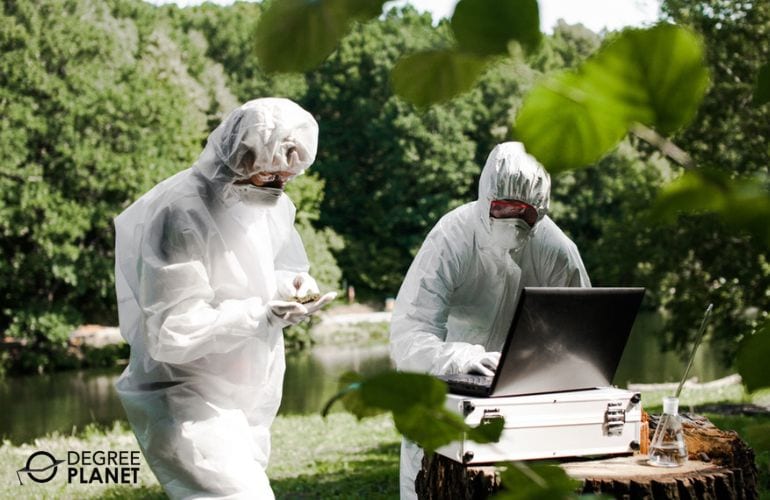
A bachelor’s degree in geoscience is designed to provide knowledge of the Earth, from the ground up. From mineral and metal exploration to environmental protection and sustainable energy, this field of study can lead to opportunities in many sectors.
Editorial Listing ShortCode:
Read on to discover more about geoscience degree programs and potential career outcomes.
Online Bachelor’s in Geoscience Degrees

In a bachelor’s of the geoscience degree program, you can learn about the functional processes of the Earth. You’ll dive into foundational aspects of the physical sciences, such as chemistry, mineralogy, earth systems, spatial awareness, and physics.
The topics you’re generally exposed to during a bachelor’s in a geoscience degree program can teach you how to:
- Identify and interpret the origin of specific minerals, rocks, and fossils in the field and lab
- Apply theories to geologic problems, such as natural disasters and climate change
- Identify and interpret sediment and stratigraphic sequences, faults contacts, and more
- Interpret and analyze geologic maps, satellite imagery, and more for use in research
- Prepare research reports using acquired data from the field and historical resources
- Develop field techniques, such as making geologic maps and recording field notes
The skills and knowledge gained in a bachelors degree in geoscience are designed to prepare students to become geoscientists. They are many different types of geoscientists and geologists, and their duties can vary depending on their positions.
Editorial Listing ShortCode:
For instance, some are involved in consulting for environmental agencies, and others work in mineral or petroleum exploration. Those in a geoscience bachelors program may choose to focus on one area of geoscience in particular, such as:
- Conservation and resource management
- Mineral or petroleum extraction
- Geospatial technology
Some states require licensure for geologists who serve the public. Geoscience bachelors could help prepare you for the licensing process.
Depending upon their concentration, graduates may also choose to focus on becoming involved with geospatial technologies, where they assist in the development of technologies like GPS. You could also choose to become involved in conservation. Some professionals advance their education to further their expertise or become educators in the field.
Common Online Geoscience Major Concentrations
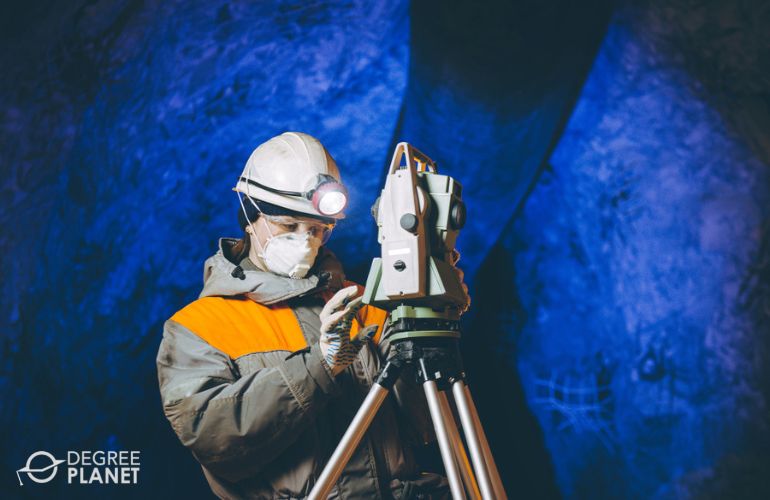
From natural disaster prediction to sustainable energy production and resource management, the field of geoscience can offer many career paths depending on your interests and goals.
This is why many bachelor degree programs in geoscience offer concentrations, such as the following:
- Natural Resources and Conservation. This concentration focuses on environmental protection, climate change, sustainable energy, and land and resource management.
- Geospatial Technology. This concentration focuses on the use of geospatial technologies, such as geographic information systems (GIS), remote sensing, laser scans, and more.
- Data Analytics. This concentration is designed to prepare you to utilize data analysis and statistics to help tackle and prevent environmental problems.
- Geology. This concentration is designed to prepare you for graduate programs in geology as well as for careers in the field and in academia related to geologic disciplines.
- Geography. This concentration is designed to prepare students for careers related to conservation, city planning, climate and soil patterns, urban environmental issues, and more. These types of positions are often found in government, the private sector, or in education.
Some concentrations aim to prepare you for entry-level positions in the field, while others focus on preparing you for an advanced degree for research or academic careers.
Geoscience Careers and Salaries
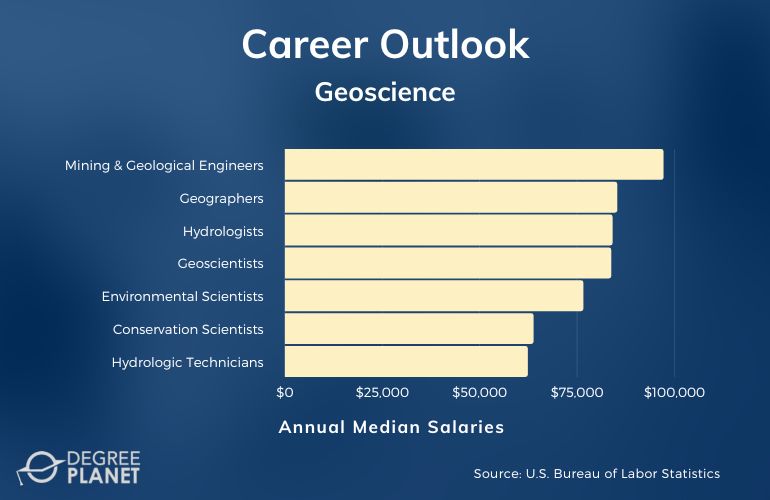
A bachelor’s degree in geosciences can help prepare graduates for entry-level positions or masters programs in the field, such as an on-campus or online masters in geoscience program.
Geoscience professionals can work in a range of positions. Some work in resource and land management, environmental protection, or energy resource industries.
According to the Bureau of Labor Statistics, here are some potential careers related to the field of geoscience.
| Careers | Annual Median Salaries |
| Mining and Geological Engineers | $97,090 |
| Geographers | $85,220 |
| Hydrologists | $84,030 |
| Geoscientists | $83,680 |
| Environmental Scientists and Specialists | $76,530 |
| Conservation Scientists | $63,750 |
| Hydrologic Technicians | $62,280 |
| Surveyors | $61,600 |
| Geological Technicians | $48,310 |
| Environmental Science and Protection Technicians | $47,370 |
Geoscientists can spend their time split between being in the field and in a lab or office, depending on their area of concentration or research.
The career possibilities with a geoscience degree can vary greatly, as there are a number of specialty areas within the field. Common areas include conservation and resource management, mineral or petroleum extraction, and geospatial technology.
Editorial Listing ShortCode:
Graduates may also start in entry-level positions assisting scientists in the field or in research. Earning a masters in the field could also expand your job opportunities.
BS in Geosciences Curriculum & Courses

While specific courses can vary depending on your school, online geoscience degree programs feature similar curricula. Core and elective courses may include the following:
- Earth System Science: This course dives into the workings of planet Earth, including its origin, physical and chemical composition, cycles, and geologic interactions and processes.
- Chemistry Fundamentals: This course overviews introductory concepts in chemistry and how to view the environment through the lens of chemistry.
- Geohazards: This course overviews natural disasters such as tornadoes, earthquakes, volcanic eruptions, mass extinctions, and the effects of climate change.
- Principles of Physics: This course covers major topics in physics, such as gravity, thermodynamics, forces and motion, light and optics, magnetism and electricity, and more.
- Spatial Awareness: This course overviews the study and usage of map formats, fence diagrams, symbology, and coordinate systems, and it also covers topics like map data collection, GPS, and GIS-based mapmaking techniques.
- Geostatistics and Data Analysis: This course overviews spatial analysis of geological and environmental data using geostatistical methods, and it explores how to apply geostatistics to the description of spatial patterns, spatial interpolation, and more.
- Atmospheric Science: This course focuses on weather movement patterns, climate change, and the fundamental principles of chemistry, physics, and fluid dynamics that influence climate and weather.
- Geoscientific Research Methods: This course focuses on helping students conduct preliminary research and develop a capstone research project.
- Leadership and Ethics in the Geosciences: This course focuses on leadership and ethics in the geosciences field and may include topics related to climate change, project management, organizational behavior, and more.
- Fundamentals of Chemistry Lab: This course covers the fundamentals of chemistry laboratory techniques and will include topics such as chemical equilibria, solutions, kinetics, and more.
Many bachelors programs in geosciences require the completion of a capstone or research project.
How to Become a Geoscientist
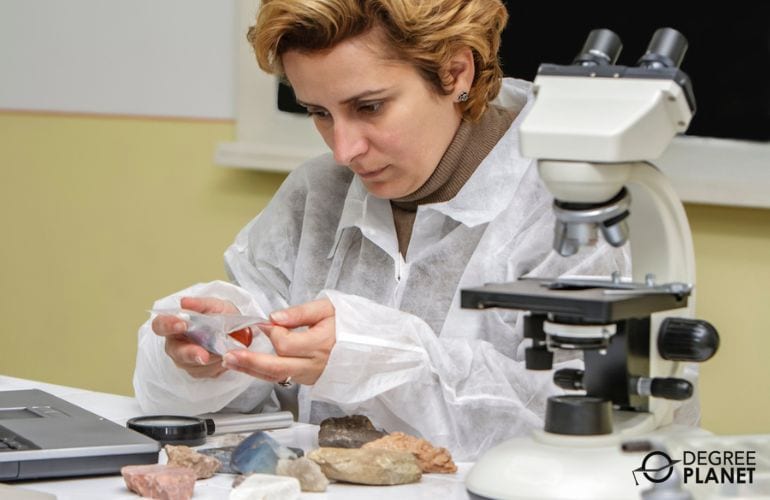
Earning a bachelor’s in geoscience is often the minimum educational requirement for becoming a geoscientist. Here are some common steps to advancing in the field, especially if your preferred career path requires licensure:
- Earn a bachelor’s in geoscience. Most geoscientists are required to hold at least a bachelor’s, as it will serve as your foundation of knowledge.
- Gain field experience. Often, you can begin to gain field experience while completing your bachelor’s degree. Through an internship, you can work alongside professional geoscientists and possibly make connections for future employment.
- Apply for entry-level positions. Entry-level geologist positions are typically supported positions for more experienced scientists. You may be involved in assisting with paperwork, conducting specific research, and more.
- Obtain a geology license. To advance into certain jobs in geoscience, including those that serve the public, obtaining a license may be necessary. In many states, working geoscientists are required to pass a professional exam. Although state requirements vary, applicants typically need at least 5 years of experience in the field before they can apply for a license.
- Apply for higher-level positions. After licensing, you can apply for higher-level jobs or even consider advancing your education into a specialized area of geoscience. Some geoscientists decide to earn a PhD so they can become a geoscience professor at the university level and conduct high-level research.
Whether you pursue licensing or advanced education depends on your desired position and career goals.
Admissions Requirements

While admissions requirements are different for every school, here are a few of the most common ones for undergraduate admissions:
- Completion of undergraduate application
- High school transcripts
- SAT or ACT scores (only some schools require them)
- Personal essay
A growing number of schools no longer require SAT or ACT scores for undergraduate admissions, so it’s helpful to check with your college to see if they are needed.
Accreditation

Determining whether your potential college or university is accredited is an essential step to take before you apply. Accreditation is, in essence, a type of quality assurance process that verifies your school meets certain professional standards.
Editorial Listing ShortCode:
A school’s accreditation status can affect your chances of receiving financial aid as well as meeting employers’ hiring standards. Regional accreditation is considered the most prestigious and widely recognized accreditation. You can visit the Council for Higher Education Accreditation’s website to check a school’s accreditation status.
Geoscience Licensure and Certifications

In 31 states, geologists are required to be licensed in order to offer services to the public. Although licensing requirements can vary by state, many require the following to obtain a license:
- Hold bachelor’s degree in geoscience or related field
- Pass the Fundamentals of Geology (FG) exam
- Complete at least 5 years, on average, of supervised geological work
- Receive a passing score on a state board examination
Some states award geologist-in-training (GIT) certification to those who pass the FG exam. In some cases, it may not be necessary to become licensed, but this depends on your goals and career path.
Financial Aid and Scholarships

Many students seek financial assistance to complete a bachelor’s degree in geosciences program. There are many types of aid options available for qualifying students, including federal aid, state aid, scholarships, grants, and more.
An abundance of scholarships and grants exist for individuals across the country depending on their needs and area of study. Looking into scholarship programs alongside student loans may help minimize overall costs. If you do need the help of student loans, both federal and state loan options may be available.
To see if you’re eligible for need-based aid from the government, you can fill out the Free Application for Federal Student Aid (FAFSA). Some employers also offer financial assistance programs to help their workers complete their college education.
What Is a Geoscience Degree?
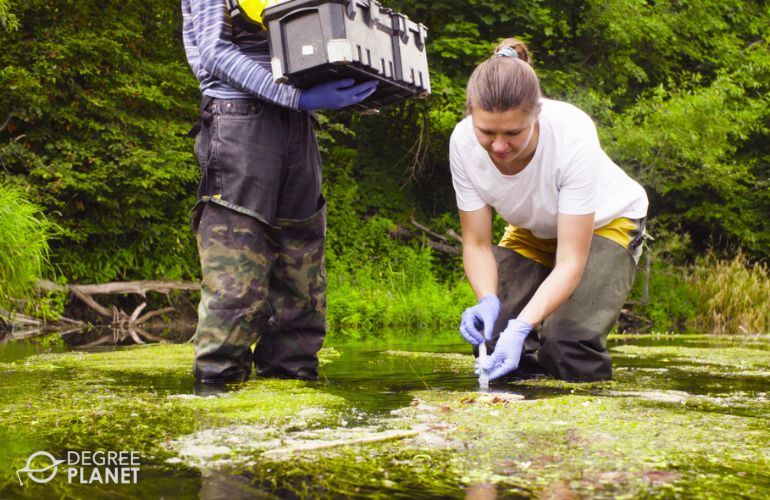
A geoscience degree is a bachelors program designed for students interested in geology and environmental issues. Students can learn about the structure and history of the earth while studying geospatial technologies, natural disasters, engineering, physics, chemistry, data analysis, and more.
This degree can help prepare students to become licensed geologists or private consultants. Graduates may even enter research positions in the field. For instance, geoscience professionals may be needed in industries involved in mineral and natural resource exploration.
Is Geoscience a Good Degree?
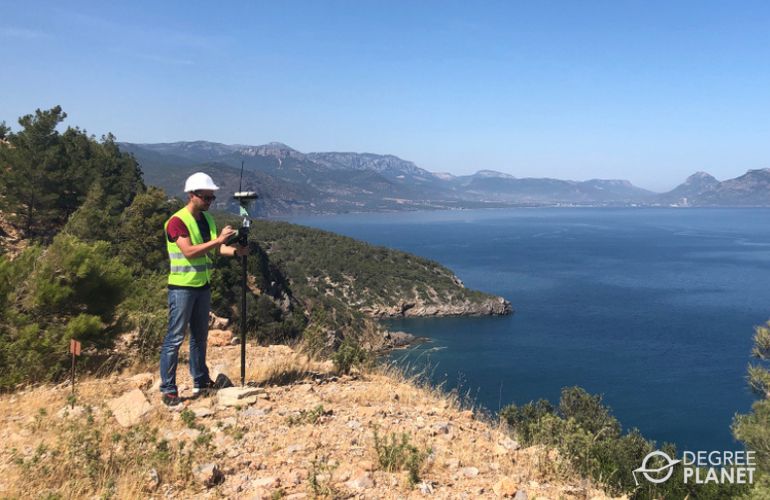
Yes, geoscience is a good degree for many undergraduate students. A bachelors in geoscience can help students enter this vast, growing field. Depending on your career path, it could also help you prepare for state licensure as a geologist.
Graduates may choose to work in sustainable energy industries, work with geospatial technology companies, or become involved in conservation and land management regulation. The median salary for geoscientists is $83,680, which is well above the average salary for all occupations (Bureau of Labor Statistics).
Graduates may also use their training to explore careers in environmental science and hydrology or pursue advanced education.
What Can You Do with a Bachelors in Geoscience Online Degree?
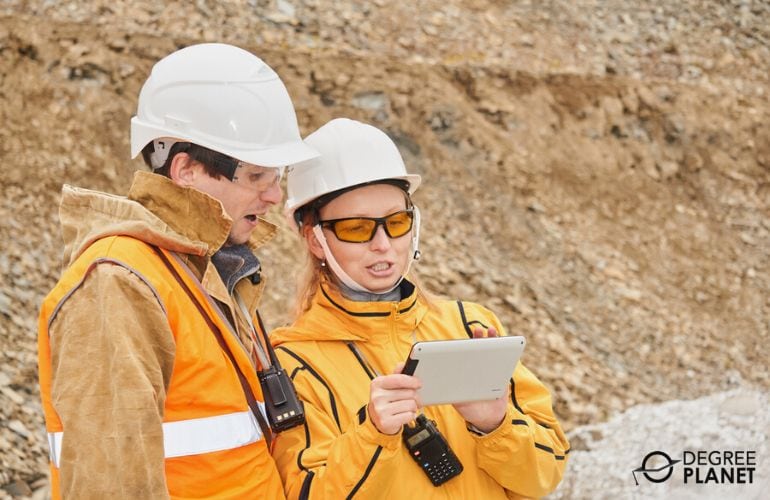
Earning a bachelor’s in geoscience online may open many paths to entry-level positions in environmental protection, sustainable energy, and other careers that involve protecting the planet.
A geoscience degree may also lead to career paths involved in predicting natural disasters and improving geospatial technologies. Graduates may find careers in the mineral and metal mining, groundwater, and petroleum industries. Geoscience professionals may also work as consultants for scientific organizations, academic institutions, museums, government agencies, and more.
Common types of geoscientists include geologists, oceanographers, seismologists, geochemists, and petroleum geologists. Related career paths include environmental scientists, hydrologists, and geological engineers.
What Does a Geoscientist Do?
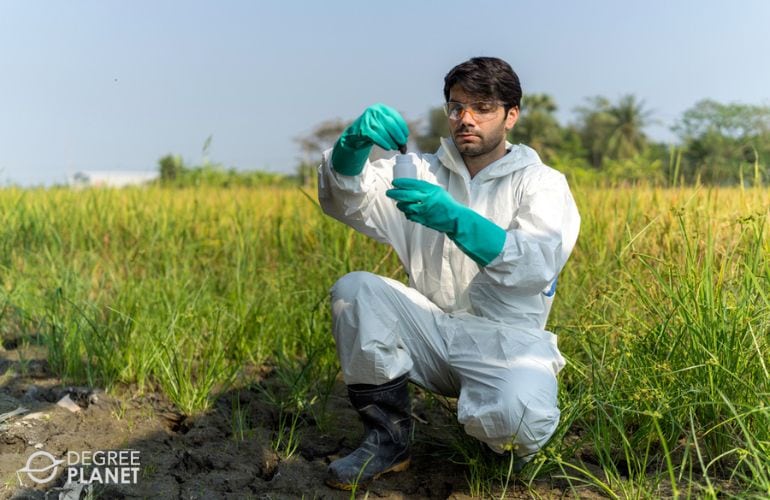
Geoscientists study the physical aspects and processes of the Earth. They are often found either in labs or in the field. In the field, some of their duties may include collecting samples, running tests, creating geologic maps and charts, and using ground-penetrating radar and other geospatial technologies.
Editorial Listing ShortCode:
A geoscientist’s specific tasks can vary depending on their position and area of specialty. For instance, some geoscientists study the structure and composition of minerals, study the Earth’s magnetic and gravitational fields, or explore optimal oil and gas deposit sites. Others might study how the chemical properties of oceans affect coastlines.
How Long Does It Take to Get a Geosciences Degree Online?

Typically, it will take 4 years to earn a bachelors degree if you follow a traditional, 16-week semester and attend full-time. If you follow an 8-week semester and stay continuously enrolled year-round, including during the summer, you can often finish in less time.
Attending part-time at any point may increase the overall length of your program. Some colleges and universities also offer accelerated online programs. Depending on your schedule and goals, you might see if your potential school has an accelerated option.
What’s the Difference Between a Bachelors Degree in Geoscience vs. Geology?
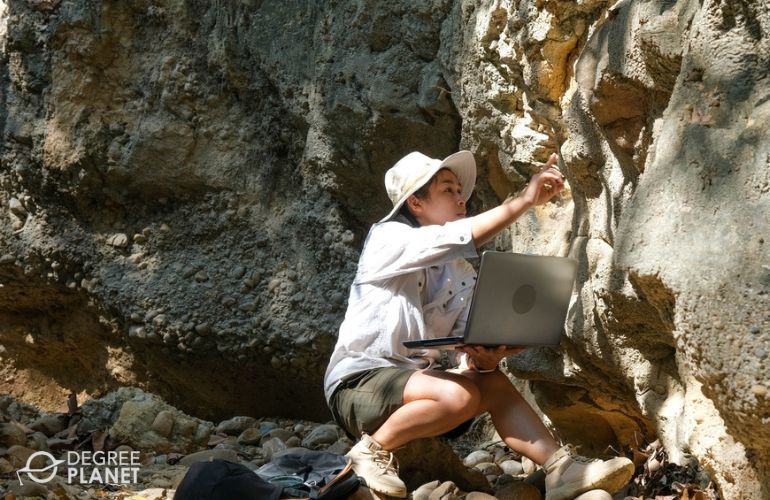
Although geoscience and geology both study the earth, geoscience, and geologist online degree programs have different focus areas.
- Bachelors Degree in Geoscience: A geoscience major includes traditional geology courses, such as mineralogy or stratigraphy. But, it also focuses on hydrology, geospatial technologies, sustainable energy, resource management, pollution, climate change, and more.
- Bachelors Degree in Geology: A geologist degree online program concentrates on earth processes in the same way as geoscience. But, it focuses more on plate tectonics, earth processes that shape and change the planet, mineralogy, oil, and gas extraction.
In short, geoscience includes geology but expands into other areas of earth science, ecology, and biology. A geologist online degree may have a
What’s the Difference Between a Bachelors in Geoscience vs. Environmental Science?
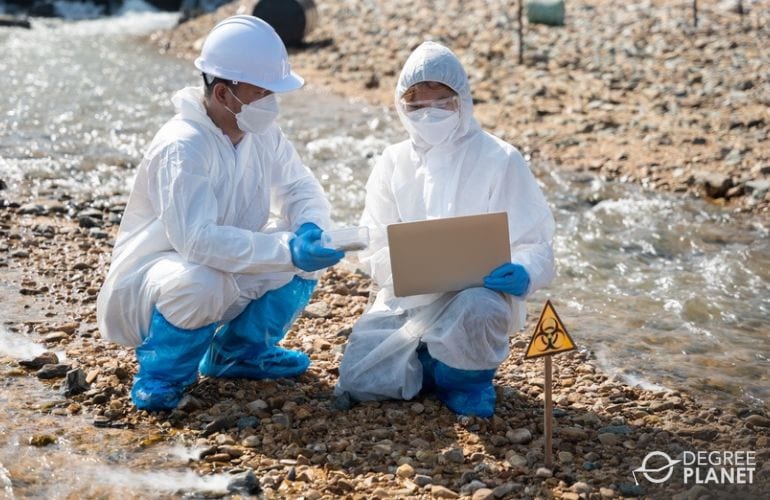
Choosing between a bachelor’s degree in geoscience and environmental science depends on your area of interest. Both degrees are interrelated but have different focuses.
- Bachelors in Geoscience: This degree focuses on earth processes using physics, mathematics, geospatial technologies, and chemistry. It studies planetary surfaces, tectonics, atmosphere, and oceans to search for natural resources, preserve the environment, and more.
- Bachelors in Environmental Science: This degree focuses more on environmental factors and issues—such as biodiversity, air and water pollution, and humans’ relationship with and impact on them.
Both geoscience and environmental science have plenty of overlap, especially in our current age in dealing with climate change.
Is a Geoscience Degree Worth It?
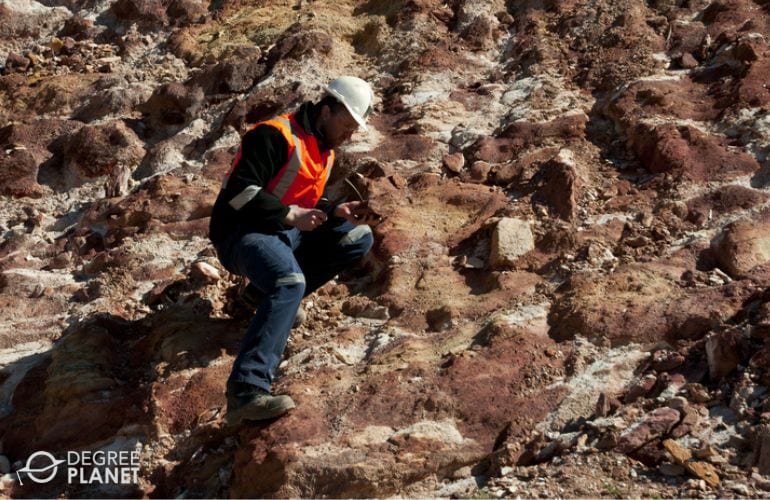
Yes, a geoscience degree is worth it for many students. Earning a geoscience degree online can help you qualify for a diverse amount of career paths, from entry-level to advanced positions.
Editorial Listing ShortCode:
According to the Bureau of Labor Statistics, employment of geoscientists is expected to increase by 5% over the next ten years, which is as fast as the average for all occupations. In addition to the range of geoscientist positions, graduates may also pursue related careers in environmental science, hydrology, consulting, conservation, and geological engineering.
Universities Offering Online Bachelors in Geoscience Degree Programs
Methodology: The following school list is in alphabetical order. To be included, a college or university must be regionally accredited and offer degree programs online or in a hybrid format.
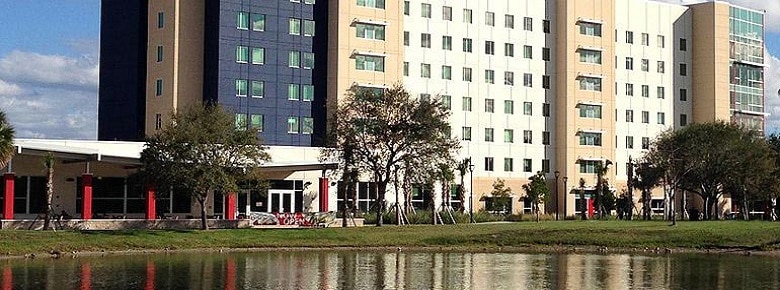
The Bachelor of Geosciences program at Florida Atlantic University offers a concentration in Geography. The program’s 100% online format is designed to provide students with flexible learning options. The curriculum is designed to equip students with the skills needed to excel in a variety of roles in private and public sectors.
FAU is accredited by the Southern Association of Colleges and Schools Commission on Colleges.
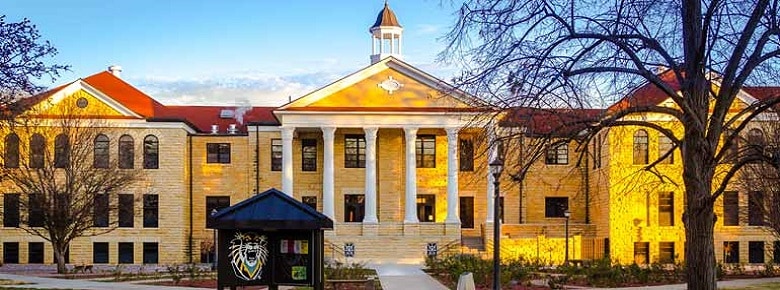
Fort Hays State University offers a Bachelor of Geosciences. This program may be an excellent next step for those interested in earth sciences and related careers. Students can select a concentration in Geology or Geography, and additional specializations are available in each discipline. Most courses are offered online, though on-campus and field-based learning opportunities may also be offered.
FHSU is accredited by the Higher Learning Commission.

Indiana University offers a Bachelor of Arts in Geosciences. The program offers concentrations in Human Geography, Geographic Information Science, Geology, Environmental Geography, and Physical Geography.
Potential courses include Geomorphology, Physical Meteorology and Climatology, Historical Geography, and Environmental Conservation. Classes are offered primarily online, though occasional on-campus residencies are required.
Indiana University is accredited by the Higher Learning Commission.
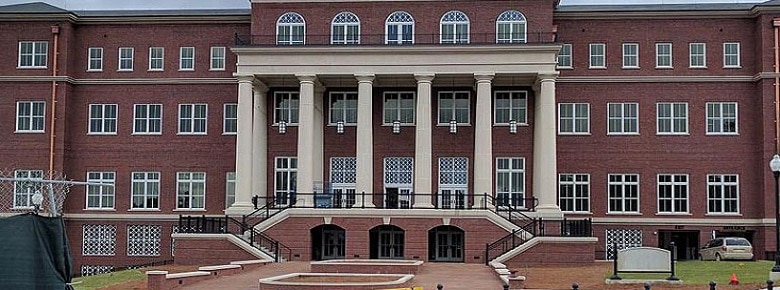
The Bachelor of Science in Geosciences program at Mississippi State University offers a concentration in Broadcast and Operational Meteorology. The degree requirements can be completed entirely online. The curriculum consists of 124 credits and covers topics like geography, climatology, weather prediction, oceanography, and thermodynamic meteorology. New students are admitted once a year in the fall.
Mississippi State University is accredited by the Southern Association of Colleges and Schools Commission on Colleges.

North Carolina Central University offers a Bachelor of Science in Environmental and Geographic Sciences with a concentration in Geoscience. The curriculum is designed to help students develop communication, critical thinking, field, and technical skills. On average, the program’s 120 required credits can be completed in 4 years of full-time study. All classes meet fully online.
North Carolina Central University is accredited by the Southern Association of Colleges and Schools Commission on Colleges.
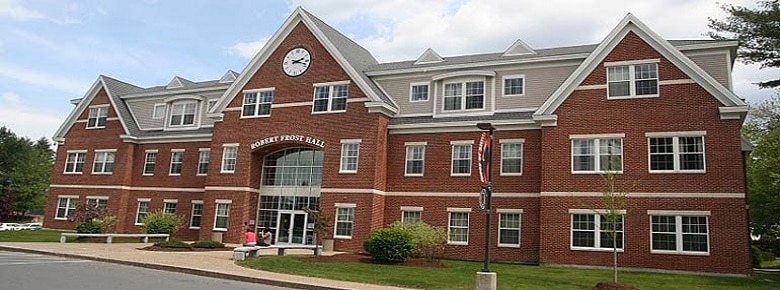
Southern New Hampshire University offers a Bachelor of Sciences in Geoscience. The program offers a concentration in Data Analytics and a concentration in Natural Resources and Conservation. In addition to convenient online classes, the program offers hands-on learning experiences in the field and on campus. Up to 90 qualifying credits from outside institutions may be transferred into the program.
SNHU is accredited by the New England Commission of Higher Education, Inc.

The University of Alaska—Anchorage offers a Bachelor of Science in Geological Sciences. Those with an interest in earth processes may find an excellent fit in this program. The program utilizes a blend of online and in-person coursework. Many graduates pursue careers in oil and natural gas, environmental geoscience, governmental agencies, and geotechnical engineering.
UAA is accredited by the Northwest Commission on Colleges and Universities.

The Bachelor of Arts in Geography program at the University of Florida offers a concentration in Environmental Geosciences. This interdisciplinary program combines concepts in geography and geological sciences. This curriculum focuses on the physical, chemical, and biological aspects of the environment and earth systems. Degree requirements can be completed entirely online.
The University of Florida is accredited by the Southern Association of Colleges and Schools Commission on Colleges.
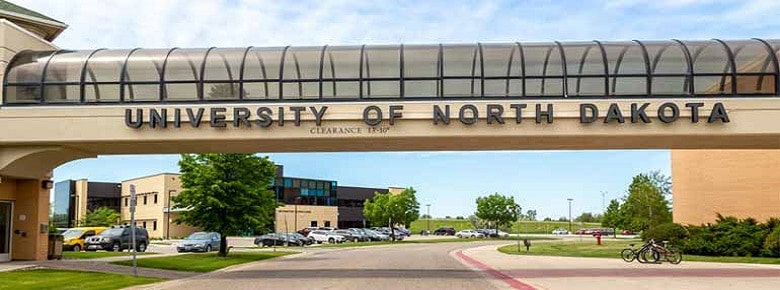
The University of North Dakota offers a Bachelor of Science in Earth Science. The curriculum covers key earth sciences subdisciplines, like geomorphology, geostatistics petrology, volcanology, and glaciology. The program’s 120 required credit hours can typically be completed in 4 to 5 years of full-time study. The program admits incoming students 3 times a year.
UND is accredited by the Higher Learning Commission.

Western Governors University offers a Bachelor of Science in Science Education and Secondary Earth Sciences. This program is designed to equip science teachers with the knowledge needed to educate students about natural resources and health of the environment. Major-specific course requirements may be completed fully online, potentially in just 3 years.
Western Governors University is accredited by the Northwest Commission on Colleges and Universities.
Getting Your Geoscience Degree Online

Earning a bachelors degree in geoscience online could let you dip your toes into the fascinating soils and processes of the Earth.
This degree may offer many diverse opportunities to work directly with the planet. Some graduates work with environmental protection agencies to engage in mineral mining, natural resource extraction, natural disaster prevention, conservation, and more.
Earning a geoscience degree online is also a convenient way to become involved in the field and gain entry-level experience. A bachelors in geoscience can also help you prepare for licensing or graduate studies in the field.
You could start exploring accredited schools today to find the geoscience program and specialization that’s right for you.

